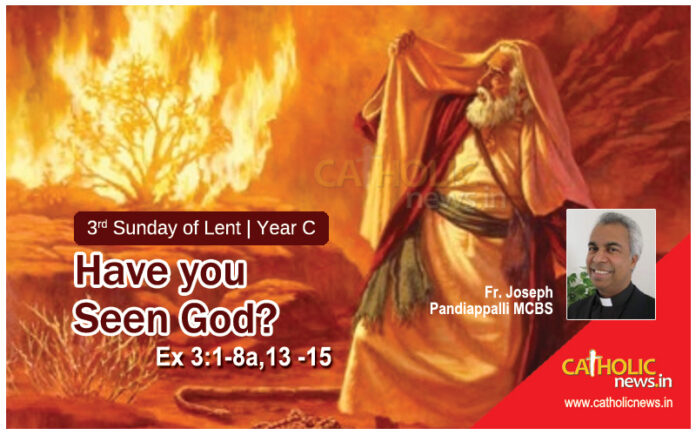
Once I saw three Jehovah’s Witnesses standing in the pedestrian zone with their brochure, the title of which read, “Who is God?” As they saw me watching them, one of them asked me, “Do you know who God is?” I replied, “No one has ever seen God?” This sentence is from the Gospel of John, verse 18 of the first chapter.
Then I asked them the same question in return: “Do you know who God is?” They repeated my answer. „No one has seen God.“ Since I intentionally gave the answer from the Gospel of John, I actually expected an answer from another passage in the Bible, or any other answer from them, because there are many passages in the Bible referring to God. The verses in the Bible are in general talks about God and the experience of God.
During Lent season, we hear and read more about God, about his revelation and people’s experience of God, and about our different ways of communicating and proclaiming this experience. Today, on the third Sunday of Lent, we heard in the first reading about Moses and his special experience of God and the answer to the question “Who is God?”
To experience God, Moses did nothing special or performed any strenuous tasks; rather, he experienced God in his ordinary, everyday life. As Moses was tending his father-in-law’s sheep and goats, he saw the thorn bush burning with a flame of fire, but the bush was not consumed. As Moses became aware of this extraordinary phenomenon and pondered the reason for this peculiarity, he heard a voice calling him by name. As he was about to approach, he was commanded not to come closer because the place was holy.
Just as Moses experienced and heard the voice of God, we too can hear the voice of God in different ways in our daily lives if we pay attention. Lent is a special time of the year for us Christians to pay attention to and to hear the voice of God.
God gave Moses the great commission to free God’s people from Egypt and lead them into the Promised Land, and to intercede for them before Pharaoh. Moses was immediately ready to fulfill this mission, a difficult one for which he would even give his life. We don’t have to fulfill such great commissions in our lives here or now during Lent. But if we listen to God’s voice and are willing to receive and fulfill a small commission, God will surely place a commission in our hearts as well. Lent is a special time for us to direct our eyes, ears, and hearts toward God and his message, and to receive and fulfill small commissions from God if necessary.
Moses asked God the question that many people ask today, as I mentioned at the beginning of my sermon. Do you know, who is God? Moses expected such and similar questions from his people. Therefore Moses asked God: “Then they will ask me, ‘What is his name? What is your name? Who is God? What shall I say to them?'” God answered Moses: “I am who I am.”
“I am who I am” is an answer we can give to anyone who asks questions about God. If we consider the different concepts of God in various religions and cultures, we can see that no tradition or culture can contradict this answer about God, because this answer doesn’t represent a precise representation. This answer doesn’t represent a human conception of God in human categories and images, but rather understands and conceives God as an incomprehensible, greater being.
An atheist once asked an Indian sage and scholar Rama Krishna, “Have you seen God?” He replied, “I have seen God, much more clearly than I see you. You can see God too, if you seek him.” This was a surprising answer to the atheist. This atheist later became his disciple and subsequently a world-renowned philosopher and religious leader.
During Lent, we are invited, like Moses, to experience God, to receive God’s commission, and to proclaim God’s faith by answering the question: Who is God? Does God exist? Have you seen God? Lat us find the answer to these questions quiet personally. Let us be able to say from the bottom of the heart: Yes, “I am who I am.” I have seen God. You, too, can know and see God.
Fr Joseph Pandiappallil MCBS



